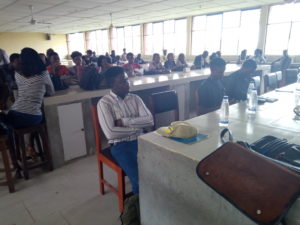By Ikwen Atuaka
Stakeholders in the education sector have said that a student’s ability to identify problems and solve them in a creative and sustainable way while in school prepares them for a better life than just waiting for blue collar jobs.
CrossRiverWatch Editor-in-Chief, Mr. Agba Jalingo and an educationist, Professor Joseph Asor stated this Monday in Calabar at an event tagged: “After School, What Next?,” organized for undergraduates in the University of Calabar.
“As you are finishing from school, one of the things you need to think of is how to use you time,” Jalingo said, adding that: “Four years of training is a long time to learn anything worthwhile and not graduating to come back and wait 7, 8 years to be employed.
Agba wondered how things have turned around such that today, artisans who train for less than 4 years are able to fend for their families while university graduates continue to walk about looking for jobs years after graduation.
“As you are leaving school, you need to start thinking of how to create. In fact, you need to start thinking of problems to solve now while in school.
“If you think because you have a first class, that will guarantee you a job then you might just be the biggest fool because jobs which hundreds of people used to do are now been automated.
“Your ability to create and solve problems in the 21st century is what will make you stand out.
“Education is not a process of osmosis where, by the mere fact that you are in a university classroom, knowledge is transferred from a region of higher concentration which is the classroom to a region of lower concentration which is your brain,” Jalingo said and warned that there was no short cut but persistent learning and imagination to be able to create and apply that imagination to solve problems.
“The reason you are in the University is not just to acquire a certificate but to be able to acquire knowledge and to be able to identify problems in the society and solve them.
“A university degree alone is no longer a guarantee that you will have a job, until you can start solving the problems bestriding society.”
He wondered why some graduates just wait to be employed after going four years in school and concluded that: “Either the training you were given was inadequate or you did not pay attention to what you were taught.”

Professor Asor pointed out that the University only prepares students for life outside but the extra effort put in by students to not just perform well in examinations but to identify ways to contribute to where ordinarily, they won’t have fit in typically.
“The system has changed from what it was decades ago and the jobs are no longer there. So, the education is to train you and you solving problems creatively will give you an edge,” said Professor Asor who is the Dean of Faculty of Biological sciences.
Also, Professor Asor charged the students to look beyond challenges such as pressure from peer groups and their parents when they go against odds to create employment by becoming entrepreneurs and be financially independent.
Furthermore, Grace another speaker said that people have failed to ask themselves the most pertinent question which is: “What next?”
She charged the students to always prepare by learning skills as the four walls of the University limits you and one can only succeed by lifting that barrier.
She said that: “Everything I do today that is giving me some money, I learnt by myself. I learnt to create a website even though I studied sociology and I have developed my website to what it is today.
“Self education is very important as that desire and hunger is what makes you get what you want.
She urged them to not just end there but gain experience by volunteering, internship and job shadowing as well as further education in their field or related fields.
Furthermore she charged them to ensure that the problem they are solving serves a social need and fetches them money and shared ways of getting grants and opportunities to succeed.
Earlier, the organizer of the program, Violet Fanseh said that the need to ensure students know that the job market is very competitive and need to develop themselves and plan for the future informed her decision to organize the event.
She charged her colleagues to “Begin to think of what you will do after school because the jobs are no longer there.”

Since You Are Here, Support Good JournalismCrossRiverWatch was founded on the ideals of deploying tech tools to report in an ethical manner, news, views and analysis with a narrative that ensures transparency in governance, a good society and an accountable democracy. Everyone appreciates good journalism but it costs a lot of money. Nonetheless, it cannot be sacrificed on the altar of news commercialization. Consider making a modest contribution to support CrossRiverWatch's journalism of credibility and integrity in order to ensure that all have continuous free access to our noble endeavor. CLICK HERE |
New Feature: Don't miss any of our news again.Get all our articles in your facebook chat box.Click the Facebook Messenger Icon below to subscribe now
Text Advert by CRWatch :Place Yours

Will You To Learn How To Make Millions Of Naira Making Special Creams From Your Kitchen?.Click Here
Expose Your Business And Make More Sales. Advertise On CrossRiverWatch.com Today



Leave feedback about this